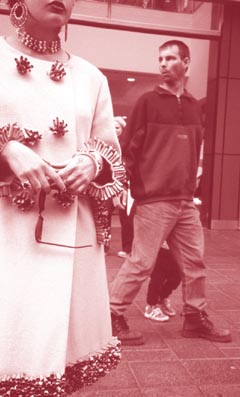Host bodies of the future
Robert Cook

Julie Kovatseff, University of SA,
Nicotine Traces: the search for the other in the city
Originality is important, and one of the dangers of creative writing classes, for instance, or any critical approach to literature, is that it under emphasises originality. After all, a professor of literature is trying to find a tradition, and influences, which can be traced. People would rather talk about Poe as the typically American genius than as the total kind of lunar nut that he really is. There is nothing typical about Poe: he’s from the moon.
Edmund White
White is aware, of course, that absolute originality does not exist. Yet he knows that it’s the grain of the individual’s voice as it exceeds the strictures of a tradition that is at least one of the thrills of creative endeavour. What interests me, is that it’s possible to be a total lunar nut even while one is channeling an artistic exemplar. Apprenticeship and finding one’s own artistic path can go hand in hand. Hatched offers the proof. And this is also the yearly pleasure of the show, as we find the host bodies that the young artists have invaded gradually morphing into something (nearly) distinct. It is, to go down the familiar Freudian path, a deliciously uncanny experience that highlights the manifold possibilities inherent in every artist’s oeuvre.
Sean Cordeiro’s accomplished $hop & Save, for instance, takes its cue from the Brit duo Jake and Dinos Chapman. Like theirs, Cordeiro’s work is not exactly burdened by emotional warmth. In it, we find a pair of store dummies who’ve been magically turned into a satyr and a centaur. Replete with fake waterfalls cascading in cheesy electronic images behind them, it is distressingly banal. As shopping arcade props meets arcadian fancy, therefore, it draws fascinating parallels between all that Hobbit-ridden mythic fantasy crap and Gucci-style fantasy bullshit; Cordeiro hints that both are about a desire for transformation and that buying into them can leave one petrified like a lump of deformed plastic. $hop & Save is Ab Fab-meets-Tolkein by other means (a severely unsettling pairing) and is a terrifically resolved, if determinedly discomforting, piece.
German artist Thomas Demand makes an appearance in Hatched as host body for David Lawrey. As you might expect, then, Lawrey’s series of photos, Plastic and Cardboard, captures a kind of fake-realness that throws the viewer entirely. They look real but there’s something wrong—like Dorothy’s house after the tornado, shaken, stirred and wrenched from the bonds of the earth, the light is a little off, the seams in the wall and ceiling feel bizarrely stressed and bowed, the curtains suspiciously stiff. Given this, the difference between Lawrey and Demand should be clear: in Demand the violence exists as hidden narrative, in Lawrey we scope the visible scars. In his deliriously pessimistic work, therefore, Lawrey traces the faultlines, the almost gothic heaviness of space, and all the impending implosions that are just waiting to fuck us up and shake our lives into new, probably pretty hideous, dimensions. A nicely paranoid post September 11 riposte.
These are just 2 examples of art education doing its job—providing students with a rich body of works and artists to enter into, to channel through, cannibalise and then spit out. Most of the work in Hatched is in this vein, and it would be pointless to tick off work by work. But this said, the show did throw up a few true Poe-style lunar nuts. To my mind, Julie Kovatseff has to be the furthest satellite. Called Nicotine traces, her work suggests she probably got bored with trains and turned to something a little less salubrious—butt-spotting. Even so, she’s as anal as any clothed capped dweeb as she presents a 1960s style dress with cigarette butts adorning the cuffs and other places, photos of chalk circles where butts were collected and, finally, a map locating their broader positions. With the chalk outlines like crime scene markings she implies the obvious that—and despite her statement that she’s not concerned with the health aspects—smoking may be tobacco-company sponsored suicide. She transcends this banality on another level, however, as the piece becomes a pungent instance of urban archeology; a nicotine stained version of Benjamin’s asphalt botanist, Kovatseff maps the moments where we suck in relief from work or whatever, and hints at an underlying oral erotics that leaves its smoky haze over entire cities.
Also from the moon are Brendan van Hek and Anthony Kelly. Van Hek’s door in its own wooden coffin, Hinge:a joint that functions in only one place, is a wonderfully Wittgensteinean work. Devilishly nihilistic, it is, like all of Ludwig’s best stuff, a piece of packaged uselessness that is both an entry to nowhere and a sign of wasted human labour. Kelly, on the other hand, provides a quirky cold war flashback that has an oddly surreal overtone. Think the setting for a stage version of a Graham Greene novel directed by Robbe-Grillet and you’ll have an idea. Just as a dumb old art fan, I also really liked Midori Oki’s series of small ink drawings, Skin Diving (see page 10), depicting a fleshy nude figure wrestling with its own skin and a small black hole. On the same theme and equally interesting was Winnie Lim’s Felt, a scattering of clothing over the wall.
To use ad-speak, Hatched has something for everyone as it shows a recently birthed art world gleefully taking from their elders what they want and junking the rest. They’re moving on and moving up and many will find themselves in the disturbing position of being host bodies one day. And it might be sooner than they think.
Edmund White is quoted from The Burning Library: writings on art, politics and sexuality 1969-1993, Picador: London, 1994.
Hatched, Healthway National Graduate Show, PICA, Perth, June 7-July 21. Online catalogue and symposium papers at www.pica.org.au/hatched
RealTime issue #50 Aug-Sept 2002 pg. 12






